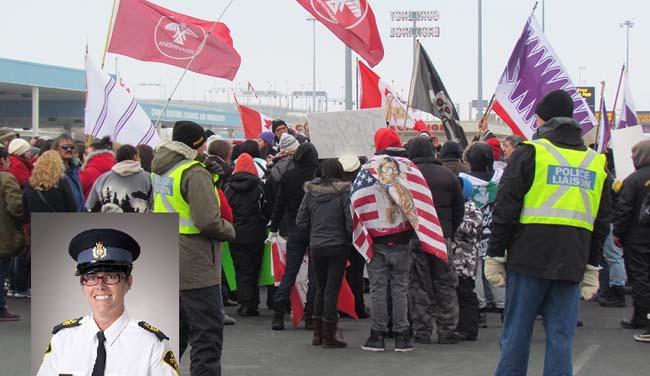OPP addresses Ipperwash Report recommendations

By Greg Plain
The 2007 Report of the Ipperwash Inquiry recommendations set out by Justice Sidney B. Linden were to be implemented by both government and police forces in Ontario.
To date, the Ontario Provincial Police have addressed, but have not yet implemented, all 25 of the 100 recommendations set out in the Report directed towards procedure and practice – with the goal to avoid violence in similar situations in the future.
One of the recommendations was to implement a team of OPP that would respond to actions taken by First Nations across the Ontario Region. The Provincial Liaison Team (PLT) is a group of officers that are mandated to deal with protests and similar actions where blockades and marches are occuring.
The OPP are split into five regions across Ontario and each of these regions have a team dedicated to this work to ensure the protests and or actions are properly dealt with, without violence. The OPP have changed the way they respond to any actions by First Nations or any other group.
Staff Sergeant Alana Jones works at OPP headquarters in Orillia and says that positive change has happened between the OPP and communities.
“There has been a positive change with effective police support and changes on critical policy and frameworks dealing with many scenarios,” says Jones. “The framework is critical policy and acts as a guideline for all officers to develop strategies to resolve conflict while minimizing the use of force.”
In 2007, the Aboriginal Liaison Team and the Major Event Liaison Team were created, but overlap of duties showed the OPP that they could deal with issues together by amalgamating the units to create the Provincial Liaison Team endorsed by Justice Linden.
There are now 151 trained officers across the province who provide support and assistance to build relationships, establish open lines of communication and function as a liaison between the police, First Nation and non-Aboriginal communities that may be impacted by protests and occupations.
In the years since the Ipperwash Report was released, the PLT unit was tested on several occasions during the Idle No More protests held across the country. There were over 150 protests held in Ontario alone – with no injuries or problems during these protests.
The OPP have put out their 2007-2012 report that highlights their accomplishments and framework approach that can be found online here: http://www.opp.ca/ecms/files/277841669.pdf Reports from 2012-2014 will be released this fall.
Since the framework changes, the Ministry of Youth and Family Services has funded Native Awareness Training Camps that are well-attended by OPP officers. The Niigan Mosewak (Walking Forward) targets youth at risk to ensure they are taught early on that ceremony and culture can assist them in day to day life. Another component of their training deals with suicide prevention and community supports. The focus of the camp was to foster positive relationships between youth and the police as well as teaching the youth life and leadership skills they can take back to their own communities. The kids also sit in on traditional cultural teachings that not only boost their self-esteem but pride in their culture.
One of the key goals of the camp is to teach the kids that the police are here to help, and are not out to get them. When the youth first come to camp, many have a difficult time interacting with the police officers, but the idea behind the program is to foster a feeling of trust so they would feel comfortable approaching an officer.
Staff Sergeant Jones says that the officers are committed to this.
“We have some amazing officers whom really care about the communities they serve and have committed to improving the relationships and restoring trust that may have been lost in the past,” says Jones. “It’s these partnerships that will help bridge the gap between police and aboriginal communities for a better future. Working together with the officers and youth will enhance the relationship, coordination of Police and community for a better relationship.”
The Report of the Ipperwash Inquiry can be found here: http://www.attorneygeneral.jus.gov.on.ca/inquiries/ipperwash/index.html


